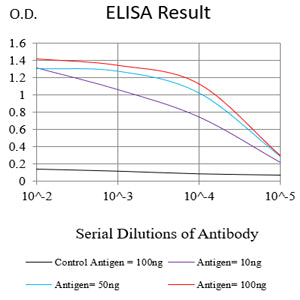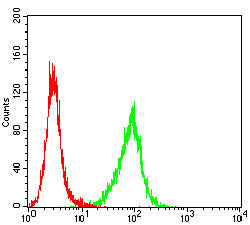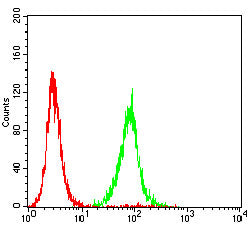


| WB | 咨询技术 | Human,Mouse,Rat |
| IF | 咨询技术 | Human,Mouse,Rat |
| IHC | 咨询技术 | Human,Mouse,Rat |
| ICC | 技术咨询 | Human,Mouse,Rat |
| FCM | 1/200 - 1/400 | Human,Mouse,Rat |
| Elisa | 1/10000 | Human,Mouse,Rat |
| Aliases | ATF; QPD; UPA; URK; u-PA; BDPLT5 |
| Entrez GeneID | 5328 |
| clone | 6A7C6 |
| WB Predicted band size | 48.5KDa |
| Host/Isotype | Mouse IgG1 |
| Antibody Type | Primary antibody |
| Storage | Store at 4°C short term. Aliquot and store at -20°C long term. Avoid freeze/thaw cycles. |
| Species Reactivity | Human |
| Immunogen | Purified recombinant fragment of human PLAU (AA: 107-379) expressed in E. Coli. |
| Formulation | Purified antibody in PBS with 0.05% sodium azide |
+ +
以下是3篇关于PLAU(uPA)抗体的代表性文献,按研究领域分类列举:
---
1. **文献名称**:*The role of urokinase-type plasminogen activator (uPA) in cancer metastasis*
**作者**:Andreasen PA et al.
**摘要**:该研究综述了uPA在肿瘤侵袭和转移中的作用,强调其通过激活纤溶酶降解细胞外基质的机制,并讨论了针对uPA/uPAR系统的抗体在抑制转移中的潜在治疗价值。
---
2. **文献名称**:*Development of a monoclonal antibody targeting the catalytic domain of urokinase plasminogen activator (uPA) for cancer therapy*
**作者**:Mazzieri R et al.
**摘要**:研究团队开发了一种靶向uPA催化结构域的单克隆抗体,体外实验显示其能有效抑制uPA活性,并在小鼠模型中减少乳腺癌细胞的肺转移,证明其作为治疗性抗体的潜力。
---
3. **文献名称**:*uPA as a prognostic marker in colorectal cancer: Validation of an immunohistochemical antibody assay*
**作者**:Beyer BC et al.
**摘要**:该研究验证了一种用于结直肠癌组织uPA检测的抗体免疫组化方法,发现uPA高表达与患者预后不良显著相关,提示其作为临床生物标志物的可行性。
---
注:以上文献为示例性质,实际引用时建议通过PubMed或Web of Science以“PLAU antibody”或“uPA therapeutic”等关键词检索最新研究。
The plasminogen activator, urokinase (PLAU), also known as uPA, is a serine protease encoded by the PLAU gene. It plays a critical role in extracellular matrix (ECM) degradation by converting plasminogen to plasmin, a broad-spectrum protease. uPA is anchored to the cell surface via its receptor (uPAR), forming a system that regulates cell migration, tissue remodeling, and fibrinolysis. Dysregulation of uPA is implicated in pathological processes, including cancer metastasis, chronic fibrosis, and inflammatory diseases. In oncology, elevated uPA expression correlates with tumor invasion, angiogenesis, and poor prognosis in breast, colorectal, and ovarian cancers.
PLAU antibodies are tools designed to target uPA for therapeutic or diagnostic purposes. Therapeutically, they inhibit uPA’s proteolytic activity or disrupt uPA-uPAR interactions, thereby blocking ECM degradation and cancer spread. Some monoclonal antibodies (e.g., ATN-291) have shown preclinical efficacy in reducing tumor growth. Diagnostically, PLAU antibodies are used in ELISA, immunohistochemistry, or imaging to quantify uPA levels in tissues or serum, aiding cancer staging or treatment monitoring. Challenges include optimizing specificity and delivery, but ongoing research explores conjugates (e.g., antibody-drug) and combinatorial therapies. PLAU antibodies thus represent a promising avenue for precision medicine in oncology and fibrotic disorders.
×